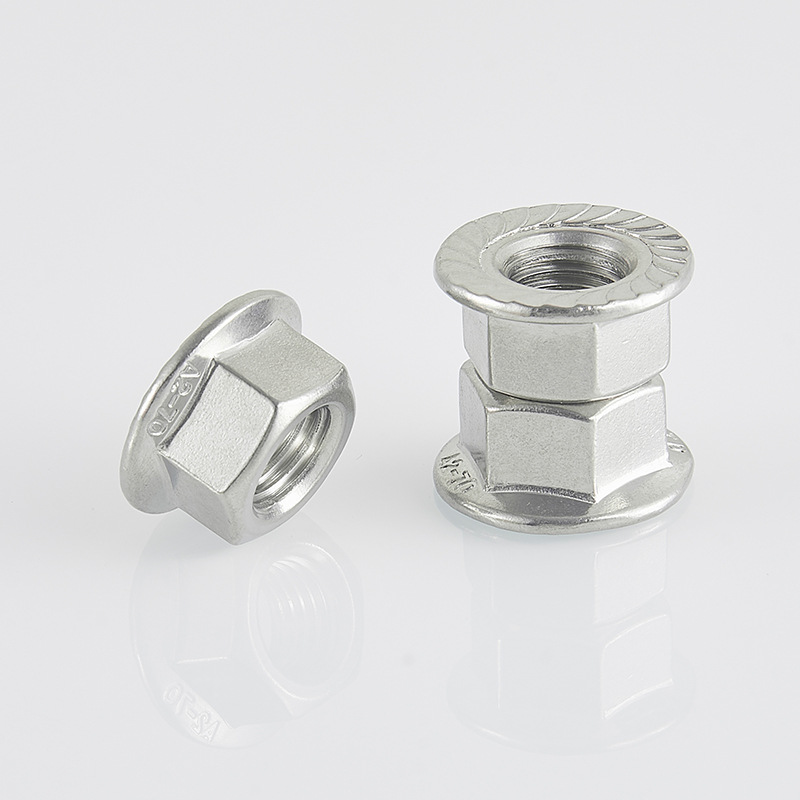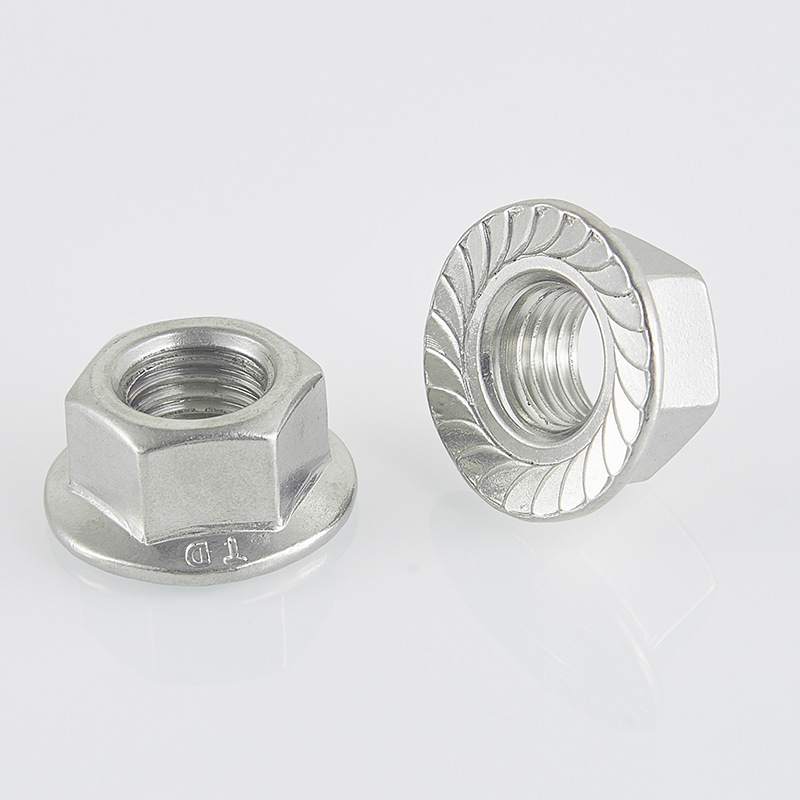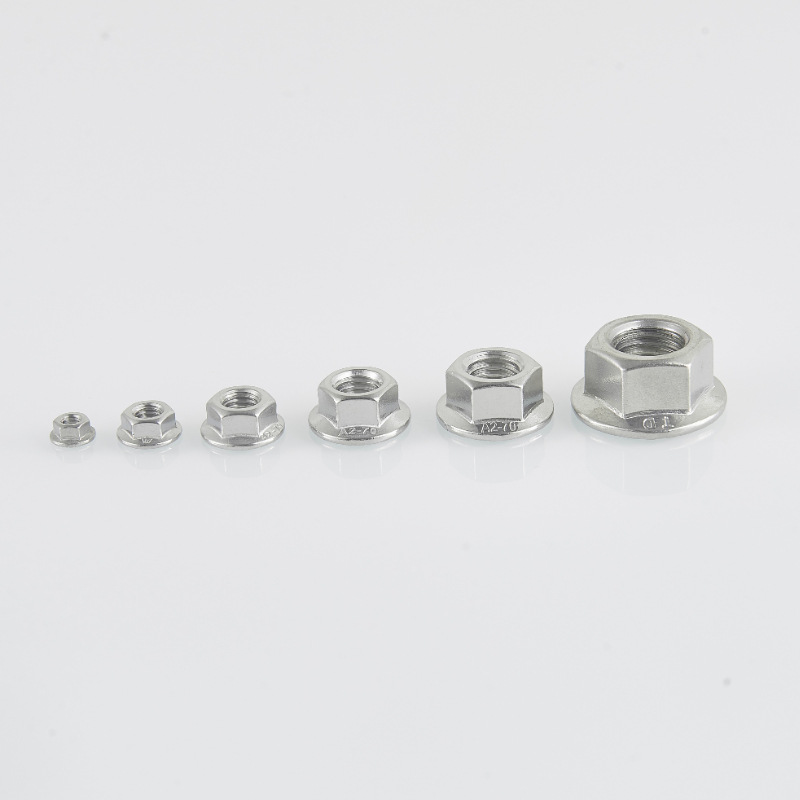

Secure & Stylish Cap Nuts for Every Fastening Need
Aug . 18, 2025 03:00 Back to list
Secure & Stylish Cap Nuts for Every Fastening Need
Advancing Industrial Fastening: The Superiority of Flange Nuts
In the demanding world of industrial engineering, the reliability of every component is paramount. Fastening solutions, often considered minor parts, play a critical role in the integrity, safety, and operational longevity of complex machinery and infrastructure. While the term cap nut might broadly refer to a range of protective or decorative nuts, the industry's trend is undeniably towards specialized, high-performance fasteners that offer enhanced functionality beyond mere aesthetics or basic protection. Modern applications demand superior load distribution, vibration resistance, and corrosion protection, leading to the widespread adoption of solutions like flange nuts. These sophisticated fasteners address the inherent challenges faced by traditional fastening methods, providing a more secure and durable connection crucial for preventing costly downtime and ensuring system integrity. As industries strive for greater efficiency and resilience, understanding the advancements in fastening technology becomes indispensable. This commitment to innovation is reflected in the stringent manufacturing processes and material science behind today's leading industrial fasteners, ensuring they meet the evolving demands of sectors from petrochemical processing to critical infrastructure projects, where failure is not an option.
The evolution of fastening technology is a testament to the continuous pursuit of engineering excellence. Traditional fasteners, while serving their purpose, often fall short in applications characterized by high dynamic loads, extreme temperatures, or corrosive environments. The introduction of improved designs, such as the flange nut, marks a significant leap forward. Unlike a conventional cap nut, a flange nut integrates a wide, circular flange at one end that acts as a washer. This design significantly increases the bearing surface, distributing the load over a larger area, which in turn reduces the risk of loosening due to vibration and enhances the joint's resistance to deformation. This integral washer design also eliminates the need for a separate washer, simplifying assembly and reducing inventory. The drive for such innovations is fueled by the escalating costs associated with maintenance and failure in industrial settings. From large-scale construction to precision manufacturing, the integrity of bolted joints directly impacts operational efficiency and safety. Therefore, the strategic selection of fasteners that offer enhanced performance and reliability, such as the hexagonal flange nut or the lock nut flange, is no longer a luxury but a necessity for achieving optimal long-term results and ensuring compliance with stringent industry standards.
The Precision Engineering Behind Flange Nuts: Manufacturing Excellence
The manufacturing of high-performance fasteners like flange nuts is a sophisticated process that integrates advanced material science with precision engineering. It begins with the careful selection of raw materials, typically high-grade carbon steel, alloy steel, or stainless steel, chosen for their specific mechanical properties such as tensile strength, yield strength, and corrosion resistance. The primary manufacturing processes include cold forming (cold heading) and hot forging, depending on the material and desired specifications. Cold heading, a process where wire stock is cut and formed into the nut's shape at room temperature, allows for high production volumes and excellent dimensional accuracy. Hot forging, on the other hand, is used for larger nuts or those requiring specific grain structures for enhanced strength. Following the initial forming, parts undergo a series of secondary operations, including threading via rolling or cutting, which ensures precise thread profiles crucial for secure fastening. Heat treatment, such as hardening and tempering, is a critical step that significantly enhances the nut's mechanical properties, including hardness, toughness, and fatigue resistance. Surface treatments, like zinc plating, hot-dip galvanizing, or special coatings (e.g., Dacromet, Geomet), are then applied to provide superior corrosion protection, especially for applications in harsh environments like marine, chemical, or wastewater treatment facilities.

Quality control is integrated at every stage of the flange nut manufacturing process to ensure adherence to stringent international standards such as ISO (International Organization for Standardization), ANSI (American National Standards Institute), DIN (Deutsches Institut für Normung), and ASTM (American Society for Testing and Materials). This includes detailed material analysis, dimensional checks, thread gauging, mechanical property testing (tensile strength, proof load, hardness), and coating thickness verification. For critical applications, non-destructive testing (NDT) methods like magnetic particle inspection or eddy current testing may also be employed to detect internal flaws. The typical lifespan of a high-quality flange nut can extend over decades, provided it is correctly installed and used within its specified parameters, even in demanding environments. These fasteners are indispensable across a wide range of industries, including petrochemical, where resistance to corrosive chemicals and high temperatures is crucial; metallurgy, for heavy-duty structural applications; and water and drainage systems, where their anti-corrosion properties and sealing capabilities prevent leaks and ensure long-term integrity. The inherent design of the flange nut, by distributing load more evenly and providing inherent anti-loosening properties, contributes to energy saving by maintaining joint tightness, reducing material fatigue, and minimizing the need for frequent re-tightening or replacement, ultimately leading to significant operational cost reductions and enhanced safety.
Technical Specifications and Performance Advantages of Flange Nuts
The robust design and manufacturing precision of flange nuts translate into a myriad of technical advantages that set them apart from other types of flange nuts and general different types of nuts and bolts. A key feature is the integrated flange, which significantly increases the bearing surface area, distributing the clamping force over a wider region. This not only reduces the likelihood of localized stress concentrations on the bolted material, thereby preventing deformation or damage to softer materials, but also enhances the joint's resistance to vibrational loosening. The increased friction between the flange and the bolted surface, coupled with the inherent elasticity of the flange, provides an effective anti-loosening mechanism, making them ideal for dynamic applications where vibration is a constant challenge. Furthermore, the absence of a separate washer streamlines the assembly process, reducing both labor time and potential for assembly errors. In terms of materials, flange nuts are commonly available in various grades, including stainless steel (A2/304, A4/316) for superior corrosion resistance, and high-strength carbon steel (Grades 8 and 10) for applications requiring exceptional tensile strength. Coatings like zinc flake or hot-dip galvanizing further augment their environmental resilience, crucial for outdoor or chemically aggressive settings.
These technical specifications directly translate into significant operational benefits across diverse industries. For instance, in petrochemical plants, where equipment is exposed to aggressive chemicals and high temperatures, the superior corrosion resistance of stainless steel flange nuts ensures the long-term integrity of pipelines and pressure vessels, significantly reducing the risk of catastrophic failures. In metallurgy, for heavy machinery and structural frameworks, the enhanced load distribution capabilities prevent material creep and fatigue, thereby extending the service life of critical components. For applications in water and drainage systems, the robust anti-corrosion properties and inherent sealing benefits provided by the flange help maintain leak-proof connections, crucial for public health and environmental protection. Compared to a standard cap nut, which primarily offers aesthetic or basic protection, the engineered features of a flange nut contribute to higher joint preload, improved fatigue life, and reduced maintenance costs. This holistic approach to fastener design ensures optimal performance, contributing not just to structural stability but also to overall operational efficiency and safety, making them a preferred choice for engineers prioritizing reliability and longevity.
Diverse Applications and Tailored Fastening Solutions
The versatility of flange nuts extends across an impressive array of industrial applications, solidifying their position as a go-to choice for engineers seeking reliable and efficient fastening solutions. Their unique design, which incorporates an integrated washer, is particularly advantageous in scenarios where space is limited, or assembly needs to be expedited. For instance, in the automotive sector, flange nuts are extensively used in chassis assembly, engine components, and wheel attachments due to their ability to withstand vibrations and maintain joint integrity, contributing significantly to vehicle safety and longevity. Similarly, in the construction industry, particularly for structural steelwork and heavy equipment assembly, the large bearing surface of a flange nut reduces the risk of embedment and ensures a secure connection even under high shear and tensile loads. The specific dimension of a flange nut M10, for example, is highly sought after in numerous machinery applications, indicating the precise and varied requirements of different industries. The integral design also makes them highly effective in preventing damage to the mating surface, which is crucial for sensitive materials or coated finishes, providing a cleaner, more professional finish compared to using a separate washer and a standard cap nut.

Beyond standard applications, the demand for customized fastening solutions is growing, driven by unique design requirements, extreme operating conditions, and the need for optimized performance. Our expertise extends to providing bespoke flange nut solutions, including specialized materials, unique thread forms, or custom coatings tailored to specific environmental challenges. Whether it's a need for higher temperature resistance in aerospace components, enhanced corrosion protection for offshore drilling platforms, or specific dimensional tolerances for intricate robotics, our engineering team collaborates closely with clients to develop fasteners that meet their exact specifications. This includes designing captive nuts variants or specific `lock nut flange` designs for critical, tamper-proof assemblies. Our process involves detailed consultation, CAD modeling, prototype development, and rigorous testing to ensure the custom solution not only fits perfectly but also performs flawlessly under anticipated operational stresses. Our commitment to customized solutions ensures that even the most niche or challenging fastening requirements are met with precision and reliability, providing a competitive edge for our clients by enabling innovative product designs and more robust system integrations.
Industry Leadership, Trust, and Unwavering Support
Our position as a leading provider of high-quality industrial fasteners, including an extensive range of flange nuts, is built upon decades of experience and a relentless commitment to excellence. Established over [mention specific number, e.g., 20] years ago, we have consistently invested in cutting-edge manufacturing technologies, advanced material research, and continuous staff training to maintain our competitive edge. Our operations are fully certified to ISO 9001:2015, a testament to our robust quality management systems that encompass every phase from raw material procurement to final product delivery. This rigorous adherence to international quality standards ensures that every flange nut and other different types of nuts and bolts we produce meets or exceeds global benchmarks for performance and durability. We have cultivated enduring partnerships with major corporations across the petrochemical, automotive, construction, and renewable energy sectors, serving as a trusted supplier for their most critical fastening needs. These collaborations are built on a foundation of proven product reliability, timely delivery, and exceptional customer service. Our engineering team, comprised of seasoned experts, is always available to provide technical consultation, assisting clients in selecting the optimal fastener for their specific application, or designing bespoke solutions when off-the-shelf options are insufficient.

Our commitment to authoritativeness is further solidified by our comprehensive testing protocols and transparent data reporting. Each batch of fasteners undergoes a series of stringent mechanical and chemical tests in our state-of-the-art laboratory, including tensile strength tests, proof load tests, hardness tests, and corrosion resistance evaluations. We provide detailed material test reports (MTRs) and certificates of conformity for all our products, offering complete traceability and assurance of quality. This dedication to data-driven quality control provides our clients with the confidence that they are receiving products engineered for peak performance and long-term reliability. We pride ourselves not just on the quality of our flange nut products, but also on the depth of our industry knowledge and the responsiveness of our technical support team. Our service cases reflect a history of successfully tackling complex fastening challenges, from providing custom lock nut flange solutions for high-vibration machinery to optimizing material selection for extreme temperature applications. By consistently delivering superior products and unparalleled service, we aim to be more than just a supplier; we strive to be a reliable partner in our clients' success, driving innovation and ensuring operational excellence across all industries we serve.
Ensuring Trust and Operational Excellence: FAQ and Support
Building and maintaining trust with our B2B clients is at the core of our operations. We understand that purchasing critical components like industrial fasteners requires absolute confidence in the product's quality, availability, and the supplier's reliability. To this end, we have established robust processes for order fulfillment, quality assurance, and customer support. Our delivery cycle is meticulously managed to ensure on-time dispatch and arrival, with advanced logistics tracking providing transparency throughout the shipping process. For urgent requirements, expedited shipping options are available, minimizing potential project delays. Each flange nut we dispatch is backed by a comprehensive warranty, covering material defects and manufacturing faults, underscoring our confidence in our product's durability and performance. Our commitment extends beyond the point of sale; our dedicated customer support team is readily available to address any post-purchase inquiries, technical challenges, or re-ordering needs, ensuring a seamless and satisfactory client experience. This holistic approach to service, from initial inquiry to long-term operational support, distinguishes us as a preferred partner in the industrial fastening sector.
Frequently Asked Questions (FAQ) about Flange Nuts
Q1: What are the primary advantages of a flange nut over a standard hex nut with a separate washer?
A1: The primary advantages include enhanced load distribution due to the integrated flange, superior anti-loosening properties, simplified assembly by eliminating the need for a separate washer, and reduced inventory management. This makes them more efficient and reliable than a standard cap nut for many applications.
Q2: Can flange nuts be used in high-vibration environments?
A2: Yes, flange nuts are specifically designed to perform exceptionally well in high-vibration environments. The larger bearing surface and integrated design increase friction against the bolted material, providing superior resistance to loosening compared to conventional nuts. Specialized types like the lock nut flange offer even greater security.
Q3: What materials are flange nuts typically made from, and how do I choose the right one?
A3: Flange nuts are commonly made from carbon steel (various grades for strength) and stainless steel (e.g., A2/304, A4/316 for corrosion resistance). The choice of material depends on the application's specific requirements, including strength demands, environmental conditions (e.g., exposure to chemicals, moisture), and temperature ranges. Consult with our technical team for material selection guidance.
Q4: Do you offer custom sizes or specific types of flange nuts, like captive nuts?
A4: Absolutely. We specialize in providing tailored fastening solutions. If your project requires a specific dimension, material, coating, or a unique design like a flange nut M10 in a specific grade, or specialized captive nuts, our engineering team can work with you to design and manufacture a custom solution that meets your precise specifications.
Q5: What is your typical lead time for large orders of flange nuts?
A5: Our lead times vary depending on the order size, material availability, and customization requirements. However, we maintain efficient production schedules and robust logistics to ensure timely delivery. We recommend discussing your specific needs with our sales team for an accurate lead time estimate and to explore expedited options if necessary. We prioritize consistent supply chain management to reduce any potential delays, ensuring your projects stay on track and within budget.
Conclusion: Partnering for Fastening Excellence
In the complex landscape of industrial applications, the choice of fastening solutions is a critical decision that impacts safety, efficiency, and long-term operational costs. While the term cap nut may cover a wide range of basic protective fasteners, the advanced design and engineering of our Flange nuts represent the pinnacle of modern fastening technology. Their superior load distribution, anti-vibration properties, and inherent ease of assembly offer distinct advantages over traditional methods, ensuring unparalleled joint integrity and extended service life in even the most challenging environments. Our commitment to rigorous quality control, adherence to international standards like ISO and ANSI, and the ability to provide customized solutions underscore our dedication to being a trusted partner for B2B clients globally. We are not just supplying fasteners; we are providing engineered solutions that contribute directly to the reliability and success of your projects. Partner with us to leverage our expertise, experience, and authoritative commitment to quality, ensuring that your fastening needs are met with precision, durability, and unwavering support.
References:
- Bickford, J. H. (1997). An Introduction to the Design and Behavior of Bolted Joints (3rd ed.). Marcel Dekker.
- Shigley, J. E., & Mischke, C. R. (2001). Mechanical Engineering Design (6th ed.). McGraw-Hill.
- American Society for Testing and Materials (ASTM) Standards for Fasteners.
- International Organization for Standardization (ISO) Standards for Fasteners.
Latest news
-
Hot Dip Galvanized Bolts-Hebei Longze|High Strength&Corrosion Resistance
NewsAug.18,2025
-
High-Strength Hot Dip Galvanized Bolts - Hebei Longze | Corrosion Resistance, High-Strength
NewsAug.18,2025
-
Secure & Stylish Cap Nuts for Every Fastening Need
NewsAug.18,2025
-
High-Strength Hot Dip Galvanized Bolts-LongZe Fasteners|Corrosion Resistance&High Tensile Strength
NewsAug.17,2025
-
Hot Dip Galvanized Bolts-Hebei Longze|High-Strength Corrosion Resistance
NewsAug.17,2025
-
High-Strength Hot Dip Galvanized Bolts-LongZe|Corrosion Resistance, High Strength
NewsAug.17,2025

